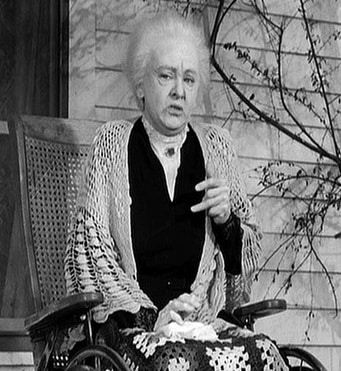Mrs. Henry Lafayette Dubose is a resident of Maycomb County, and is first described by Scout as “plain hell.” She lives alone, except for a Negro girl in her constant attendance, and is thoroughly detested by both Jem and Scout.
On passing her house, the children are “raked by her wrathful gaze” and “subjected to ruthless interrogation” regarding their behavior. She is very old and spends most of her day either in bed or in a wheelchair. Mrs. Dubose is rumored by the neighborhood to keep a pistol concealed under her shawls.
Mrs. Dubose constantly aims vicious remarks at the children. She is thoroughly disapproving of Atticus, commenting on the mental stability of the Finches, calling the children names like “disrespectful mutts”, which makes Jem furious. Atticus advises Jem to empathize with the old lady, and tells him, “You just hold your head high and be a gentleman.”

However, Jem’s fury is evoked by a particularly unpleasant remark made by Mrs. Dubose, “Your father’s no better than the n*ggers and trash he works for!” In his rage, he cuts the tops off every camellia bush in her yard and litters the round with buds and leaves. When he later goes to apologize to her, he is asked by her to read to him every afternoon for a month. Jem is unwilling but soon complies.
When Jem and Scout go to her house, they are met by an “oppressive odor”. Jem begins reading to her, and although at the beginning she listens with rapt attention, her corrections grow “fewer and farther between” as the reading progresses.
Soon, Jem and Scout realize that something has happened to Mrs. Dubose. “Her head moved slowly from side to side. From time to time she would open her mouth wide, and I could see her tongue undulate faintly.” In a few minutes, the alarm rings, and the children are asked to leave.
This routine continues every afternoon, and Jem and Scout soon notice that their reading time has been increasing each day. “Today she had antagonized Jem for nearly two hours with no intention of having a fit, and I felt hopelessly trapped.”
However, Jem’s reading days soon come to an end, and shortly after, news of Mrs. Dubose’s demise is received.
When Atticus comes home after seeing Mrs. Dubose breathe her last, he hands Jem a candy box gifted by her, containing a “white, waxy, perfect camellia.” He tells the children that Mrs. Dubose was a morphine addict, and was told by her doctor that she had only a few months left. Mrs. Dubose wished to “leave the world beholden to nothing and nobody”, and thus she meant to break herself free from her addiction. Atticus tells them that she died as free “as the mountain air”.
Mrs. Dubose’s lesson to the children is the meaning and essence of true courage. She had the choice of remaining a morphine addict as she had only a few more months to live, but she chose to free herself from her addiction despite the agony it caused her. Atticus wanted his children to know what real courage is, “instead of getting the idea that courage is a man with a gun in his hand.”
Atticus tells them, that courage is when “you know you’re licked before you begin but you begin anyway and you see it through no matter what.” According to him, Mrs. Dubose was the bravest person he ever knew.
Apart from conveying the message of courage, Mrs. Dubose also teaches the children the qualities of courteousness and tolerance. Jem eventually learns to treat Mrs. Dubose’s vindictive remarks with a “face devoid of resentment.” “Through the weeks he had cultivated an expression of polite and detached interest, which he would present to her in answer to her most blood-curdling inventions.”
Mrs. Dubose also holds views that are entirely different from those of the children, yet Atticus calls her a ‘lady’, thus showing the children that every person is entitled to his own opinions, and deserves complete respect regardless of his beliefs and ideas.
